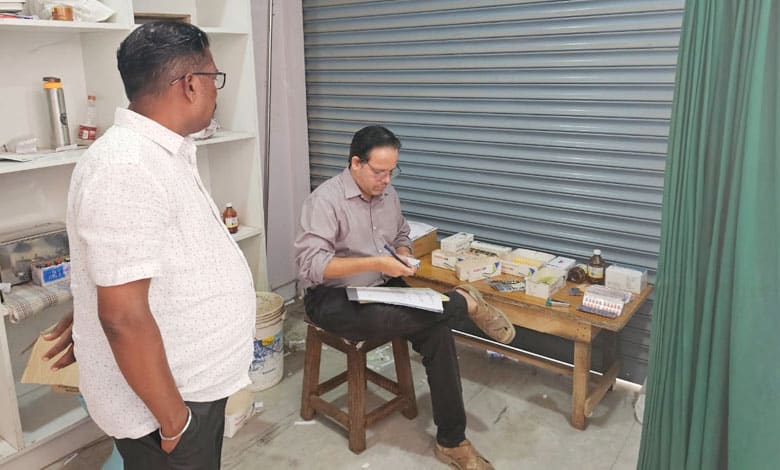Telangana Drugs Control Administration Cracks Down on Illegal Medical Practices in Warangal
Telangana Drugs Control Administration raided an unqualified practitioner’s clinic in Warangal, seizing illegally stocked medicines. Since January 2024, 147 cases have been registered against quacks for unauthorized drug sales.

Hyderabad: The Drugs Control Administration (DCA) of Telangana conducted a significant raid on an unauthorized medical clinic in Warangal, uncovering illegal stocking and sale of medicines.
This operation is part of an ongoing statewide crackdown on unqualified medical practitioners, commonly known as quacks, who pose a serious risk to public health.
Table of Contents
Warangal Quack’s Clinic Raided; Illegal Drugs Seized
On February 19, 2025, acting on credible intelligence, DCA officials raided the premises of an unqualified medical practitioner, Gaddam Srinivas, at D. No. 18-1-130/1, Urus Warangal, Warangal District. The individual was found conducting medical practice without the necessary qualifications and operating without a valid drug license.
During the raid, officials discovered 14 varieties of medicines, including antibiotics, steroids, and analgesics, stocked illegally at the clinic.
The estimated value of the seized drugs was Rs. 10,000. The presence of antibiotics such as Gentamycin was particularly alarming, as unregulated distribution and misuse of such medications contribute to the growing problem of Antimicrobial Resistance (AMR), a major global health concern.
In addition to antibiotics, DCA officials found steroids like Dexamethasone at the clinic. The misuse of steroids can lead to severe health complications, including immune system suppression, hormonal imbalances, muscle and bone weakness, cardiovascular issues, and psychological disorders. The indiscriminate sale of steroids and antibiotics without proper medical oversight poses significant risks to the general public.
Statewide Crackdown on Quacks and Illegal Drug Sales
Since January 2024, the Telangana DCA has registered cases against 147 quacks across the state for illegally stocking and selling medicines. This intensified action aims to curb the unauthorized medical practice that endangers public safety.
The raid in Warangal was carried out under the supervision of Dr. G. Rajyalakshmi, Assistant Director, Warangal, with Drugs Inspector Sri. M. Aravind Kumar leading the operation. DCA officers collected samples of the seized medicines for laboratory analysis, and further investigations are underway to identify other offenders involved in the illegal supply chain.
Legal Consequences for Violators
The Drugs and Cosmetics Act imposes stringent penalties for the unauthorized stocking and sale of medicines. Those found guilty can face imprisonment of up to five years. Additionally, wholesalers and dealers who supply medicines to unlicensed entities are also liable for prosecution. The DCA has reiterated that wholesalers must verify the validity of a recipient’s drug license before supplying medications to prevent legal repercussions.
- Also Read | Telangana Drugs Control Administration Cracks Down on Illegal Drug Stocking: Here Are the Details
Public Awareness and Reporting Mechanisms
The Telangana Drugs Control Administration encourages the public to report any suspicious drug-related activities, including illegal medical practices, unauthorized medicine sales, and the manufacturing of narcotic or psychotropic substances.
Citizens can lodge complaints through the DCA’s Toll-Free Number 1800-599-6969, operational from 10:30 AM to 5:00 PM on all working days.
This latest action by the DCA highlights the government’s commitment to ensuring safe and legal medical practices in Telangana. The ongoing crackdown serves as a warning to unqualified practitioners and illegal drug suppliers, reinforcing the importance of compliance with healthcare regulations to protect public well-being.
